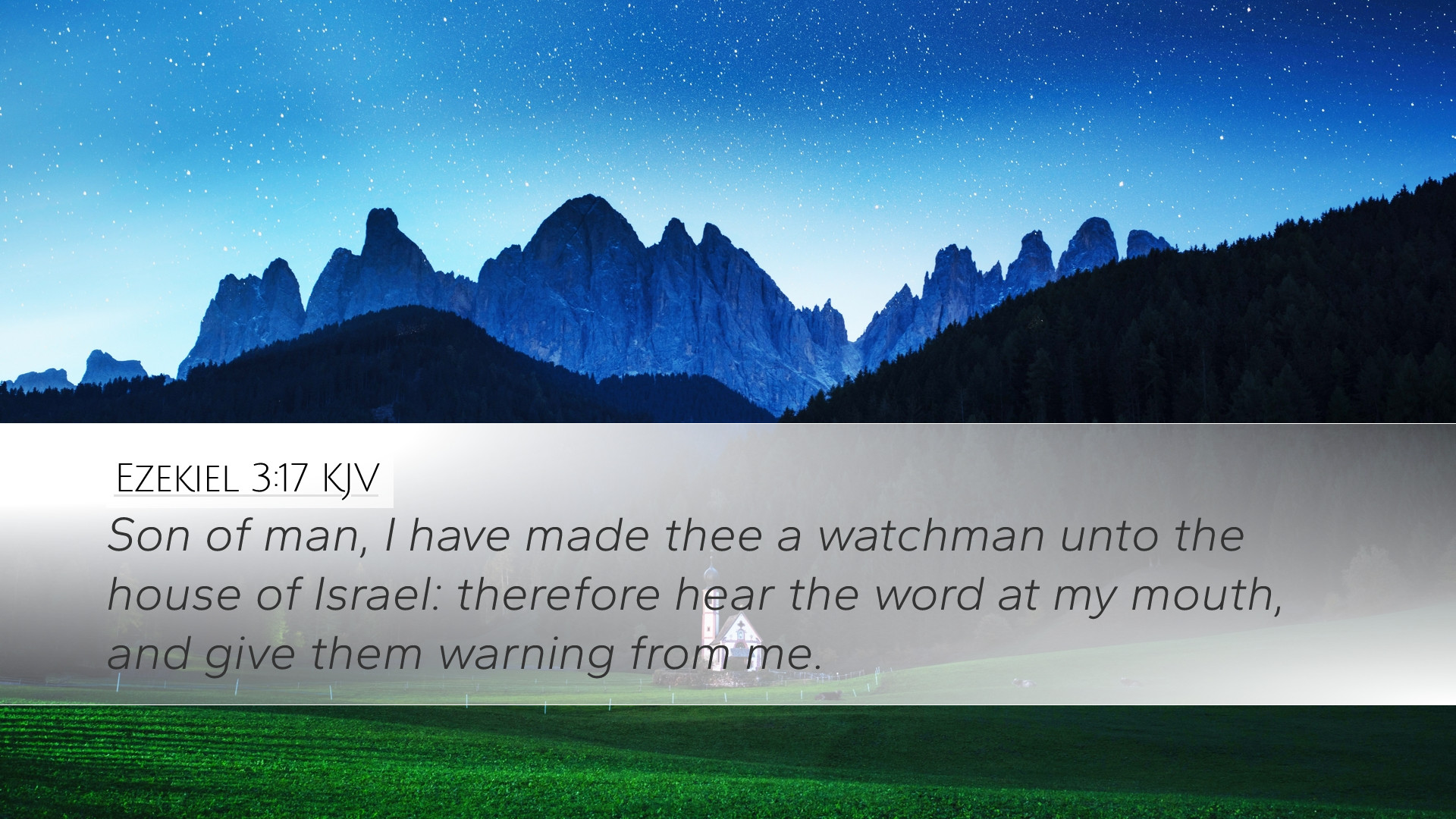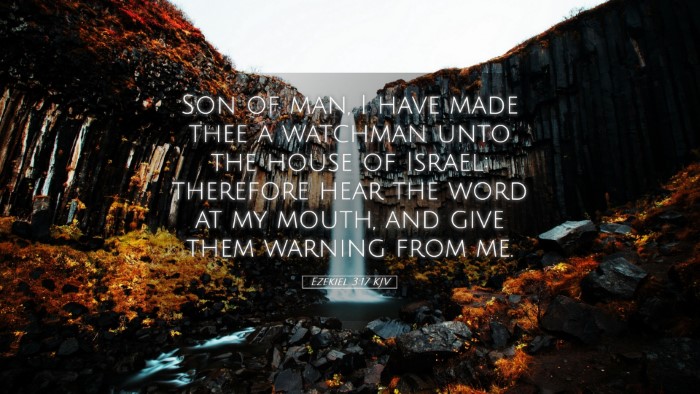Bible Commentary on Ezekiel 3:17
Verse: "Son of man, I have made you a watchman for the house of Israel; therefore hear a word from My mouth, and give them warning from Me."
Introduction
The call of Ezekiel, as a prophet and watchman, represents a crucial moment in the narrative of Israel's history. This verse, Ezekiel 3:17, encapsulates God's mandate to His prophet, establishing the seriousness of the prophetic office and the weight of responsibility that accompanies it.
Key Themes
- Watchman Role: The metaphor of the watchman is significant in the biblical context, implying vigilance and a duty to protect and forewarn the people of impending dangers.
- Divine Communication: The necessity of hearing God’s word and delivering it faithfully highlights the channeling of divine revelation to human understanding.
- Accountability of the Prophet: The verse underscores the accountability of the prophet to communicate God’s warnings, with implications for both the prophet and the people.
Commentary Insights
Matthew Henry: Henry emphasizes that the role of the watchman is not only a position of honor but one of great responsibility. The watchman must remain vigilant and attentive to the signs and warnings from God. He notes the importance of distinguishing the watchman’s obligation to warn the people and the severe consequences if he fails to do so. The watchman’s failure to fulfill his duty is a direct failure to honor God’s command, leading to judgment not only on the individuals who disregard the warning but also on the watchman himself.
Albert Barnes: Barnes elaborates on the nature of God's communication to Ezekiel. He points out that being a watchman includes hearing the word of God and then conveying that word to the people. The prophet must receive divine revelations and warnings, which he is expected to deliver with clarity and urgency. Barnes emphasizes that this role is pivotal in Jewish tradition and establishes a parallel for Christian ministers today, who are tasked with proclaiming the Gospel and warning against sin and judgment.
Adam Clarke: Clarke provides insight into the implications of being called a “watchman.” He explores the broader theological implications associated with this role, asserting that it extends beyond Ezekiel to encompass all those who have been entrusted with God’s message. Clarke encourages leaders of faith to uphold their responsibilities earnestly, stressing that the consequences of neglecting this duty can lead to a community's spiritual demise. He further explains that the watchman’s role is characterized by a burden for the people, motivating the prophetic voice to call them back to God.
Theological Reflections
- The Nature of Prophetic Duty: The prophetic duty is not merely to predict or foretell but to guide, warn, and shepherd the community towards repentance and obedience. The essence of the prophetic voice is embedded in love and concern for the spiritual well-being of God’s people.
- The Role of Divine Agency: The passage reflects the partnership between the divine and the human. God initiates the call and equips the individual with the necessary words and warnings, thus emphasizing God's sovereignty and the human response required in obedience to that call.
- Church Leadership Today: Modern church leaders can view this scriptural mandate as a call to engage with their congregations diligently. It applies to preaching the whole counsel of God, which includes both comfort and warning.
Practical Application
This verse has a profound implication for pastoral ministry today. Leaders must cultivate a deep and listening relationship with God to accurately discern His voice and convey His warnings. Here are some practical applications:
- Spiritual Vigilance: Pastors and leaders should maintain a lifestyle of prayer, seeking to be in tune with God’s message for their congregation.
- Faithful Proclamation: There is a call to faithfully preach and teach the complete Word of God, including both its affirmations and admonitions.
- Encouragement to Accountability: Leaders must foster a culture of accountability within their communities, encouraging congregational members to respond to God's warnings and guidance.
Conclusion
Ezekiel 3:17 serves as a timeless reminder of the weight of responsibility that comes with faithfully communicating God's message. The role of the watchman is not outdated; rather, it continues to resonate in our current era, urging believers in leadership to be proactive, vigilant, and responsible in their ministry work. Exalting the importance of God's Word and the necessity of sounding the alarm when necessary, the verse calls us to stand firm in our prophetic duty, acting as God’s instruments for warning and reconciliation.


